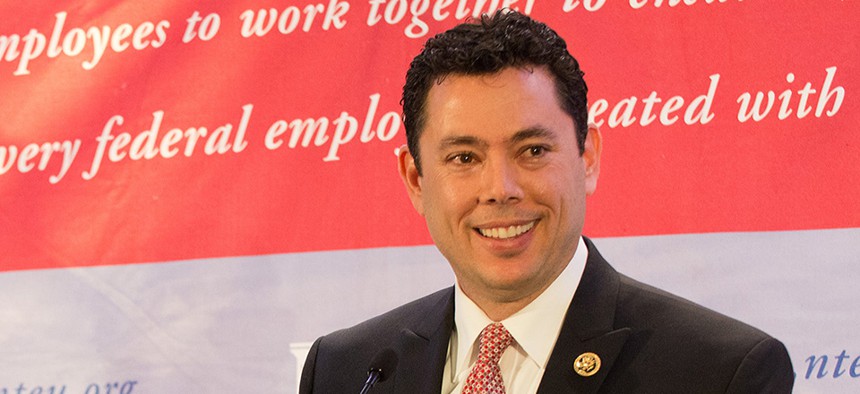
House Oversight and Government Reform Chairman Jason Chaffetz NTEU
Oversight Leaders From Both Parties Endorse Pay Raise for Feds
But agreement over treatment of federal workforce largely stops there.
The chief House members with oversight of the federal workforce at a conference Wednesday expressed their legislative priorities for dealing with civil servants, with both agreeing on the idea of a pay raise but differing drastically on other initiatives.
House Oversight and Government Reform Chairman Jason Chaffetz, R-Utah, and his ranking member, Rep. Elijah Cummings, D-Md., both addressed the National Treasury Employees Union’s annual legislative conference, telling attendees they appreciate their work and spoke of the need to end the disparaging remarks often directed at the federal workforce.
Chaffetz said he supports a pay raise, but declined to say how much, while Cummings has embraced a 3.8 percent pay increase proposal. In his budget blueprint unveiled this week, President Obama put forth a 1.3 percent raise for feds, his largest proposal in six years. “I love the president,” but the suggestion is not enough, Cummings told attendees.
Aside from the broad rhetoric exalting feds, Chaffetz and Cummings had little in common to say. The divergent tenor in the Washington hotel ballroom was palpable, with the Republican chairman’s speech met with side chatter mixed with light applause and the Democratic ranking member’s address kicked off with a standing ovation and ensuing silence from the crowd.
Chaffetz offered to work with NTEU and others to “make the system better,” but only as a condition of federal employees and groups first working with him to “figure out a way to root out the bad apples.
“Where I need your help is where we can find incidences where someone is creating a destructive work environment,” he said. “Help us with legislation that will root them out, and in return I will do everything I can to make sure you’ve got a good, productive workforce, that we pat you on the back and pay you for the good work you’ve done, that you get rewarded in many different ways for that, and that we make the system better -- and we do it in a bipartisan way.”
Without mentioning him by name, Chaffetz said that simply by making that offer, he was proposing an improvement over his oversight predecessor, Rep. Darrell Issa, R-Calif.
“I hope you can see that I’m trying to find that balance,” Chaffetz said, “and bring balance back to where it hasn’t been before.”
NTEU National President Colleen Kelley said after his speech she wanted to maintain an open dialogue with Chaffetz -- the lawmaker had said Kelley “can come see me anytime” -- but a discussion of “bad apples” was a bad way to start the conversation. Chaffetz promised to prioritize agency-specific pay reforms such as the Border Patrol bill Obama signed into law in December, and ease the process for inspectors general to interview employees and Information Technology overhauls in the early part of his chairmanship tenure.
Cummings, on the other hand, offered effusive praise of the federal workforce, and voiced discontent over a number of measures he expects his Republican colleagues to advance. While Cummings and Chaffetz expressed admiration of each other -- Chaffetz even said he and his ranking member had a “romantic” evening together when the latter visited the former’s home district in Utah -- they offered clearly different visions for the future of the workforce.
“So many people come to government knowing they will not make the kind of money they would make in the private sector,” Cummings said, “but they come to government to feed their souls.”
Cummings mentioned the ways in which Congress and Obama have asked federal employees to sacrifice in recent years, noting the negative impact it has had on morale. He said that assault could continue, with proposals to eliminate defined-benefit pensions for federal employees, cut the size of the workforce and make it easier to fire feds by expanding provisions of last year’s VA reform measure to all of government.
The Maryland Democrat, who represents thousands of federal employees, vowed to fight against these proposals and in favor of due process protections. Without them, Cummings said, the country “runs the very real risk of politicizing the federal workforce.” He added that federal managers already have the tools to deal with poor performers.
Cummings defended the General Schedule system -- which Obama said this week should be revamped -- warning of a disastrous attempt by the Defense Department in the George W. Bush administration to move to a pay-for-performance system. He also criticized a bill to fire all federal employees delinquent on their taxes, a measure previously championed by Chaffetz. Cummings called the measure “counterproductive” as it would take income away from the workers, thereby making it harder for the government to ever recoup the money it’s owed.
“Congress cannot continue to target the federal workforce without serious consequences,” Cummings said. The lawmaker instead promised to introduce legislation to strengthen anti-discrimination and whistleblower protections.
He told attendees, echoing a message delivered to feds by Obama earlier this week, not to let the criticisms of some to mitigate their passion.
“You feel discouraged,” Cummings said, “but I’ve come here to let you know: I’ve got your back.”







